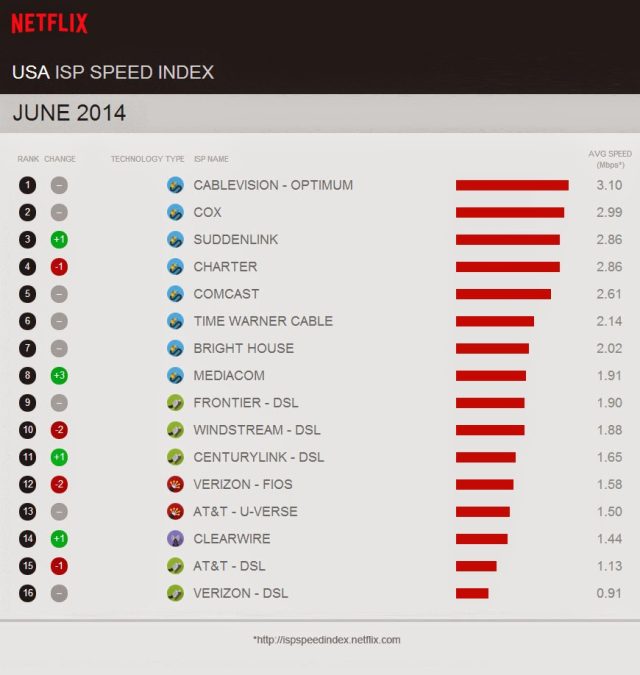Verizon Internet customers who want to watch Netflix at high quality and without interruption just can't catch a break. While Comcast subscribers saw near-immediate speed improvements after Netflix paid for a direct connection to the Comcast network, Netflix performance on Verizon remains poor—and it's getting worse.
Netflix's latest ISP speed rankings, released today, show that the average prime time streaming speed on Verizon FiOS dropped from 1.9Mbps in May to 1.58Mbps in June, a decline of 17 percent. Verizon DSL dropped from 1.05Mbps to 0.91Mbps, a decrease of 13 percent.
Verizon FiOS previously dropped from 1.99Mbps in April to 1.9Mbps in May, while Verizon DSL had dropped from 1.08Mbps in April to 1.05Mbps in May.
Verizon last week blamed Netflix for the problem, saying that the video company is sending traffic over congested links. That's true, but it's not the whole story. Netflix agreed to pay Verizon for a direct connection to the ISP's network on April 28, but Verizon hasn't been able to set up enough links yet. Verizon has said the connections will start rolling out incrementally this month and should be completely installed by the end of 2014.
Netflix performance is also getting worse on AT&T, though that's less of a surprise since Netflix has not yet agreed to pay AT&T for a direct connection. AT&T U-verse performance dropped from 1.7Mbps in May to 1.5Mbps in June, while AT&T DSL performance dropped from 1.26Mbps in May to 1.13Mbps in June.
Netflix performance on Comcast dropped a bit too, from 2.72Mbps to 2.61Mbps, but it remains far better than on Verizon or AT&T. Cablevision, which agreed to give Netflix free connections to its network, leads major ISPs in the US with a rating of 3.03Mbps. The US average across all ISPs is 2.18Mbps.
Netflix recommends a broadband connection of at least 1.5Mbps, though 3Mbps is recommended for standard quality and 5Mbps is recommended for high definition video. The company's rankings are based on an average of all streams and do not show what percentage of customers are able to stream in HD.
Here are the latest rankings in full:


reader comments
142